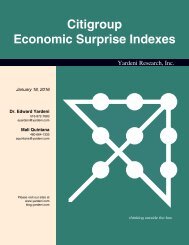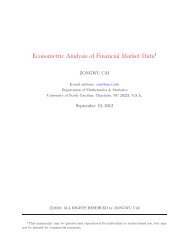Illiquid Asset Investing 1. Liquidating Harvard
Illiquid Asset Investing 1. Liquidating Harvard
Illiquid Asset Investing 1. Liquidating Harvard
You also want an ePaper? Increase the reach of your titles
YUMPU automatically turns print PDFs into web optimized ePapers that Google loves.
Andrew Ang <strong>Illiquid</strong> <strong>Asset</strong> <strong>Investing</strong> <strong>Asset</strong> Management<br />
has a slightly better mortality rate than the general population. From this analysis, can we<br />
conclude that smoking is actually good for you? Of course not! We have taken a biased sample<br />
that contains smokers blessed with longevity who are, so far, invulnerable to the detrimental<br />
effects of smoking. If you were to take up smoking today what are the odds that you would end<br />
up in this lucky group 20 years later? Or would you die from emphysema (or heart disease, or<br />
lung cancer, etc.) before the experiment could be repeated in 20 years time?<br />
Surviving funds in illiquid asset management are like those lucky, long-lived smokers. We<br />
observe the returns of surviving funds precisely because they are still around, and they are<br />
generally above average. All of the unlucky illiquid managers disappear and thus stop reporting<br />
returns. These non-survivors have below average returns. 8 Industry analysis of buy-out funds,<br />
venture capital funds, or [insert your favorite illiquid asset class] tends to encompass only firms<br />
that have survived over the period of the analysis. But do we know that the small venture capital<br />
firm we’re investing in today will be around 10 years later? Existing firms and funds, by dint of<br />
being alive today, tend to have better-than-average track records. This produces reported returns<br />
of these asset classes that are too good to be true.<br />
The only way to completely remove the effect of survivorship bias is to observe the entire<br />
population of funds. In illiquid asset markets we never observe the full universe.<br />
We can gauge the impact of survivorship bias with mutual funds, which are required to report<br />
their returns to the SEC because they fall under the 1940 Investment Act. This allows us to see<br />
the whole mutual fund universe (at least when the funds become registered) and to compute the<br />
effect of survivorship bias. (I provide more details in Chapter XX.) Survivorship bias knocks at<br />
8 Jorion and Goetzmann (1999) argue that survivorship bias partly explains the high equity premium, see Chapter<br />
XX: Countries where we have long histories of equity returns are, by definition, those countries where equity<br />
investments have prospered.<br />
10




